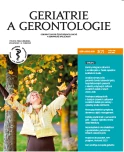Influence of reminiscence therapy on health condition and quality of life of seniors in long-term hospital care - preliminary results
Authors:
Mgr. Kvetoslava Hošková 1; PhDr. PhD. Hana Janečková 2; Mgr. Jelena Skibová 3
Authors‘ workplace:
Oddělení geriatrie a následné péče, Thomayerova nemocnice, Praha
1; Ústav ošetřovatelství 3. LF UK
2; Institut klinické a experimentální medicíny
3
Published in:
Geriatrie a Gerontologie 2019, 8, č. 3: 99-106
Category:
Original Article
Overview
Long-term care for geriatric patients in hospitals relates to the risk of psychological deprivation and decrease of self-care, not only in connection to their health problem but also as a result of lack of activities and underestimation of non-pharmacological therapy. Reminiscence offers methods that can activate inner resources of older adults and bring important salutogenic potential. The pilot study aimed to evaluate the effect of non-pharmacological intervention in the form of reminiscence therapy on the selected indicators of health status and quality of life of seniors hospitalised on the Geriatric Department of the Thomayer Hospital in Prague, and compare the results with a control group without such an intervention. The sample was composed of 104 hospitalised patients. Apart of self-assessed health status, scales measuring activities of daily living (ADL), depression (GDS), cognitive functions (MoCA) and quality of life (WHOQOL-BREF) were used. Preliminary results showed positive effect of the reminiscence therapy in all areas of the quality of life and in the health status of the intervened group. Analysis of variance with repeated measures and grouping variable showed significant differences between intervened and control groups in the pre-test and post-test scores (p<0.001). In GDS both groups improved and the difference between groups remained non-significant. Reminiscence therapy is a non-pharmacological intervention with positive effect on health status and quality of life of hospitalized seniors. It contributes significantly to the improvement of self-suffiency, cognitive functions, depression and self-assessed health status. Its use in the hospital care for older adults could improve the effect of the whole therapeutic process.
Keywords:
Quality of life – non-pharmacological intervention – reminiscence therapy – health status – hospitalised seniors
Sources
1.Sedláčková J. Nezastupitelná role rehabilitace u geriatrického pacienta na lůžkách následné péče. Geriatrie a gerontologie 2018; 3(7): 117–120.
2. Bláhová J, Holmerová I. Potřeby starších lidí v nemocniční péči – analýza výsledků review české literatury. Geriatrie a gerontologie 2018;3(7): 113–116.
3. Janečková H, Vacková M. Reminiscence. Využití vzpomínek při práci se seniory. Praha: Portál 2010.
4. Špatenková N, Bolomská B. Reminiscenční terapie. Praha: Galén 2011.
5. Janečková H. Assessment of reminiscence group work with families caring for a person with dementia. In: Štěpánková H, Šlamberová R. Stárnutí 2014. Sborník příspěvků z Gerontologické mezioborové konference 3. LF UK v Praze, 24 –25. října 2014 : 64–74 (Online) Dostupné z: www.konferencestarnuti.cz/files/Starnuti_2014_sbornik.pdf
6. Janečková H, Čížková H, Nentvichová Novotná R. a) Reminiscence v konceptech péče o starého člověka. Sociální služby 2015; 3 : 24–26; b) Využití vzpomínek v pečujících rodinách a komunitě. Sociální služby 2015; 4 : 16–21.; c) Život vzpomínek v domovech – od jednotlivce ke komunitě – 1. část. Sociální služby 2015; 5 : 14–16; d) Život vzpomínek v domovech – od jednotlivce ke komunitě. - 2. část. Sociální služby 2015; 6 : 36–38.
7. Siverová J, Bužgová R. Reminiscence v péči o seniory s demencí. Česká a slovenská psychiatrie 2016;112(2): 88–93.
8. Janečková H, Holmerová I, Vaňková H, Kašlíková T. Reminiscenční terapie a výzkum jejího efektu na kvalitu života seniorů v institucionální péči. Geriatrie 2008; 14(1): 19–27.
9. Pinquart M, Forstmeier S. Effects of reminiscence interventions on psychosocial outcomes: A meta-analysis. Aging & Mental Health 2012;16(5): 541–558.
10. Siverová J, Bužgová R. The effect of reminiscence therapy on quality of life, attitudes to ageing, and depressive symptoms in institutionalized elderly adults with cognitive impairment: A quasi-experimental study. Int J Ment Health Nurs 2018; 27(5):1430–1439.
11. Fry PS. Structured and Unstructured Reminiscence Training and Depression among the Elderly. Clinical Gerontologist 1983; 1(3): 15–37.
Labels
Geriatrics General practitioner for adults Orthopaedic prostheticsArticle was published in
Geriatrics and Gerontology

2019 Issue 3
- Memantine Eases Daily Life for Patients and Caregivers
- Possibilities of Using Metamizole in the Treatment of Acute Primary Headaches
- Memantine in Dementia Therapy – Current Findings and Possible Future Applications
- Hope Awakens with Early Diagnosis of Parkinson's Disease Based on Skin Odor
-
All articles in this issue
- Editorial
- Influence of reminiscence therapy on health condition and quality of life of seniors in long-term hospital care - preliminary results
- Geriatric scales and rehabilitation after proximal femur fractures.
- Scale for measuring apathy in people in retirement homes
- Virtual reality as a way of keeping seniors activ in retirement homes.
- Economic analyses of long-term care in the Czech Republic
- Selected tools for evaluation of geriatric fragility
- Principles of Montessori approach in the care of persons with dementia
- Dopis vnoučeti jako začátek dialogu
- Potřeby starších křehkých lidí v nemocniční péči v kontextu modelu podpůrné péče – recenze publikované integrativní přehledové studie
-
Nodl M. Středověk v nás
Vydalo: Argo 2015 - Setkání českých a evropských geriatrů
- EUGMS: otevřené dveře k evropské spolupráci
- Podpetřínská tradice mladých pokračuje
- Geriatrics and Gerontology
- Journal archive
- Current issue
- About the journal
Most read in this issue
- Selected tools for evaluation of geriatric fragility
- Virtual reality as a way of keeping seniors activ in retirement homes.
- Geriatric scales and rehabilitation after proximal femur fractures.
- Influence of reminiscence therapy on health condition and quality of life of seniors in long-term hospital care - preliminary results
